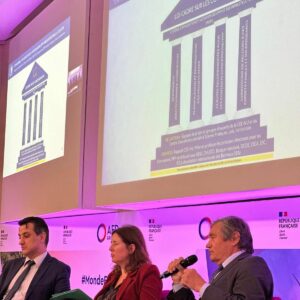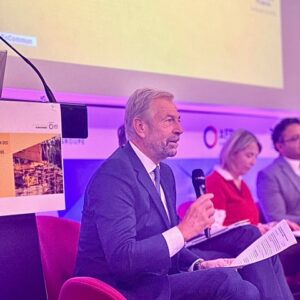At Paris InfraWeek 2024, held on November 8, WAPPP solidified its growing influence in public-private infrastructure partnerships. The one-day event, organized by AFD (Agence Française de Développement) and FIN INFRA, provided a platform to discuss pivotal themes, including small-scale PPPs and standardized frameworks for sustainable infrastructure in developing countries.
Highlighting UNECE’s Framework for Sustainable PPPs
WAPPP showcased the UNECE initiative on “Law and the Standardization of PPPs to Accelerate Sustainable Infrastructure in Developing Countries.” Marc Frilet, General Secretary of the UNECE International Centre of Excellence and Chair of WAPPP’s Legislative Framework Chapter, presented one of its key pillars.
A separate session, moderated by WAPPP, focused on small-scale PPPs and introduced collaborative work with UNECE on “Small-Scale PPPs: A Key to Achieving UN 2030 Sustainable Development Goals (SDGs).” Jacques Follain, member of WAPPP’s Executive Committee and Chair of WAPPP’s Airport PPP Chapter, emphasized their transformative potential.
Addressing Challenges in PPPs Through a Three-Pillar Framework

The roundtable discussion, “Law and the Standardization of PPPs to Accelerate Sustainable Infrastructure in Developing Countries,” tackled critical issues, such as Africa’s 90% failure rate in infrastructure project closures and the high distress rate of PPPs within two years. For the first time, representatives of the three essential pillars for sustainable PPPs shared the stage, presenting a cohesive and actionable framework:
Pillar 1:
Focused on directives recently adopted by over 20 African countries in the UEMOA and CEMAC zones, this pillar provides a foundational regulatory framework for regional PPPs.
Pillar 2:
Presented by Marc Frilet, with contributions from Tony Bonnici (UNECE), Olivier Ginepro (FIN INFRA), and Anne-Charlotte Gros (Fondation pour le droit continental), this pillar offered practical recommendations. Developed over a decade by 100+ experts, it includes the UNECE Concession/PPP Framework Law, operational standards, contract templates, and procedures that prioritize environmental, social, and climate imperatives aligned with the SDGs.
Pillar 3:
Delivered by Gilles Pélissier (French Council of State, Conseil d’État), this pillar highlighted France’s case law, which has resolved public-private contract disputes for over a century. Known for balancing social, economic, and financial interests, this jurisprudence mitigates project risks and ensures long-term success.
Pathways to People-First PPPs
The discussions underscored a holistic approach to overcoming PPP challenges in developing countries, offering tools and frameworks that enable impactful and sustainable infrastructure projects.
Marc Frilet remarked, “Paris InfraWeek was a unique opportunity to showcase inclusive tools, particularly the underrecognized case law framework central to the UNECE standards. This package, including the UNECE Concession/PPP Framework Law, provides a practical pathway for People-First PPPs aligned with the SDGs. The global interest following the event highlights the need for countries to adopt this ‘Pantheon’ of inclusive PPPs to build a sustainable project pipeline.”
WAPPP’s participation at Paris InfraWeek 2024 has furthered critical conversations around public-private partnerships and emphasized the urgency of adopting standardized frameworks for sustainable development worldwide.
The session on Small-Scale PPPs spotlighted the critical role Small-Scale PPPs in addressing global infrastructure challenges.

Jacques Follain moderated the session and the event brought together over 100 participants, including experts and practitioners, to discuss strategies, opportunities, and barriers in implementing Small-Scale PPPs.
The session highlighted how Small-Scale PPPs can significantly contribute to achieving the UN’s Sustainable Development Goals (SDGs). These projects offer solutions for filling infrastructure gaps, especially in developing countries where public funding alone is often insufficient.
Expert Insights
Key speakers shared their perspectives and experiences on this evolving topic:
• Steven Van Garsse, Vice-Chair of UNECE’s Committee on Innovation, Competitiveness, and PPPs, highlighted the importance of structured small-scale PPPs. He introduced collaborative work between WAPPP and UNECE, which aims to publish comprehensive guidelines by early 2025 to streamline these projects globally.
• Doris Chevalier, Founder of Infraboost and Observer at UNECE’s Working Party on PPP, focused on the financial and bankability challenges faced by Small-Scale PPPs, emphasizing the need for innovative funding solutions.
• Riadh Ben Khalifa, a Senior PPP Advisor, shared valuable lessons from developing Small-Scale PPPs in the water and energy sectors of developing countries, showcasing their transformative potential.
• Thibault Manchon, Founder of Cultival, presented a cultural PPP project in Paris, shedding light on its challenges and scalability for similar ventures in other cities.
• Jean-Pascal Pham-Ba, Senior Consultant at Accuracy, discussed his work on small-scale renewable energy PPPs, advocating for the use of standardized processes and technology to enhance project execution.
Challenges and Opportunities
The discussions revealed several critical challenges hindering the adoption of small-scale PPPs. High development costs and complex processes often delay private sector involvement. Limited accesses to local financing add another layer of difficulty, particularly in emerging markets.
Finally, unlike large PPPs, Small-Scale PPP projects require tailored approaches due to their more localized impact, modest budgets, and unique risks.
However, Small-Scale PPPs can be implemented more rapidly than large-scale projects and are well-suited for fostering energy transitions and generating significant local economic and social benefits, such as job creation and business stimulation.
Case Studies
Case studies presented during the session, demonstrated the diversity and versatility of small-scale PPPs. Examples covering from road maintenance and healthcare facilities to waste management and cultural projects like a light and sound show at the Dôme des Invalides in Paris.
Each case highlighted the importance of government commitment, investor confidence, and the use of simple, effective frameworks to ensure successful outcomes.
Key takeaways and messages
To unlock the full potential of small-scale PPPs, participants emphasized several actionable strategies:
1.Simplification of Processes: Legal and financial frameworks need to be streamlined to reduce development costs and accelerate implementation. Concise documentation is crucial to attract private investment.
2.Government Leadership: Strong public sector involvement is vital, particularly in risk analysis and ensuring project sustainability.
3.Focus on Scalability: Small-scale PPPs should incorporate replicable models from the outset to maximize the return on initial investments and development efforts.
4.Local Financing Solutions: Leveraging local capital and ensuring attractive returns on equity, even for modest investments, are critical for encouraging private sector participation.
The session concluded with a shared optimism about the potential of small-scale PPPs. Participants agreed that these partnerships are realistic and scalable, offering promising solutions for various sectors.
The collaborative effort by WAPPP and UNECE to develop guidelines by 2025 was lauded as a significant step toward standardizing and facilitating small-scale PPP implementation worldwide and great expectations were shown as regards the publication of guidelines related to Small Scale PPPs early 2035.

